CaptchaToday
CaptchaToday is an invasive app that gets installed in the main browser and causes it to show obstructive ads and pop-up messages on the screen during online sessions. Through manipulating the search engine and the homepage, CaptchaToday can also cause the uncontrolled generation of sudden page-redirects.

Any app that tries to flood the screen of your computer with advertisements while you are online browsing the Internet can potentially be regarded as unwanted. Case in point, a software application named CaptchaToday was recently reported by a big number of web users who have made complaints about the tendency of the app to generate excessive numbers of online advertisements, annoying box messages and even automatic page-redirects to sites that are mainly focused on selling different products.
Captcha Today Top
In addition the ad-induced irritation that users tend to face with the Captcha Today Top virus in their computers, it’s also likely that this app would introduce modifications to the browser it gets installed on. Some of the potential changes that can be expected from the Captcha Today Top virus are to the starting page and the new-tab page of the browser as well as to its search engine.
So far, we know that CaptchaToday, Total ReCaptcha, Link2Captcha can invade Chrome, Firefox and Opera but other browsers like IE, Edge and Safari may also be potential targets of the unwanted software. Because of all these annoying traits of the application in question, we believe that it can be classified as a browser hijacker. In case you have never before heard of this term, we should tell you that the hijacker apps are different from any type of virus or malware. Though they may seem like harmful and hazardous apps, they don’t normally try to mess with the user’s data or system in the way that Trojans, Rootkits, Ransomware and other malware representatives would try to. Besides, the majority of browser hijacker apps are actually legal and use legal channels of distribution (most notably, the file bundling method). Despite all of what has just been mentioned, however, it is still preferable if you do not keep CaptchaToday or any other similar app in your computer and browser and that is why we have made sure to help you uninstall the invasive software:
Let’s tell you more about the possible methods of distribution
It is highly likely that if you have had this annoying app added to your browser, you actually have no idea how it all happened. This is mainly because CaptchaToday and other software pieces of the same kind do not typically get distributed on their own. This is actually quite understandable – after all, the browser hijacker apps are not the most popular add-ons for a regular user’s browser due to their annoying behavior and invasive ads. Because of this, in most cases, a hijacker like CaptchaToday would be bundled with another program’s installation file or included in an automatic update for some software that you already have. The good news is that you can easily disable the installation of the hijacker if you uncheck its entry from the Advanced setup section in the installer that carries the undesirable app. However, most users don’t do that and instead spam the “next” button until everything gets installed which, in most cases, means that the unwanted hijacker app enters the system as well.
SUMMARY:
| Name | CaptchaToday |
| Type | Adware/Browser Hijacker |
| Detection Tool |
Some threats reinstall themselves if you don’t delete their core files. We recommend downloading SpyHunter to remove harmful programs for you. This may save you hours and ensure you don’t harm your system by deleting the wrong files. |
Remove CaptchaToday Virus
CaptchaToday is a piece of software, that, if kept on your system for long, could make it really annoying to browse the web or use your device normally. The removal of the browser hijacker, however, could also be a tricky process, therefore we recommend you follow the guidelines below to get rid of CaptchaToday quickly and effectively:
- As a Start, open the hijacked browser and go to its settings
- Then, click on More Tools (or Add-ons) and then open the Extensions tab/icon.
- Once the Extensions page opens, search for extensions or add-ons that seem to have a relation to CaptchaToday, look unfamiliar, or you believe are causing you the browsing disturbance.
- Uninstall these extensions by clicking on the Remove button/Trash bin icon next to each of them. To avoid any possible confusion, below we have described how to do that in IE and Mozilla Firefox, but if you are using another browser, the instructions most likely will be similar if not identical:
![]() Remove CaptchaToday from Internet Explorer:
Remove CaptchaToday from Internet Explorer:
Launch IE, then click the gear icon ![]() and select Manage Add-ons.
and select Manage Add-ons.
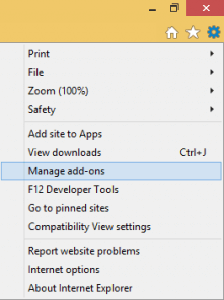
If you find a potentially unwanted or suspicious-looking extension, select > Disable.
Also, don’t forget to check the homepage settings by going to ![]() —–> Internet Options and replace the homepage URL to whatever you like in case that it has been hijacked, then save your changes by clicking on > Apply.
—–> Internet Options and replace the homepage URL to whatever you like in case that it has been hijacked, then save your changes by clicking on > Apply.
![]() Remove CaptchaToday from Firefox:
Remove CaptchaToday from Firefox:
Start Firefox and click ![]() ,, then select > Add-ons > Extensions and Disable any extension that you don’t find necessary for your browser.
,, then select > Add-ons > Extensions and Disable any extension that you don’t find necessary for your browser.

After you are done with that, open a new tab and start using your browser to see if the nagging ads, pop-up and redirect links are gone.
If CaptchaToday is not gone and its activity is still disturbing you, then aside from removing any potentially unwanted extensions from the problematic browser, you may need to follow a few more steps to deal with the hijacker once and for all. For that, we recommend you carefully repeat the instructions in the manual CaptchaToday removal guide below and let us know if you come into any trouble.

For your convenience, make sure that you Bookmark this page with CaptchaToday removal instructions in your browser or open it on another device so you can refer back to it and complete all the steps.
Another preparation step that we recommend you to take is to reboot the computer that CaptchaToday has invaded in Safe Mode (please follow the link for detailed instructions on that). Safe Mode will allow you to easily spot any unusual processes and apps that are running on your system and eventually stop them.

WARNING! READ CAREFULLY BEFORE PROCEEDING!
A lot of browser hijackers run one or more ad-generating, page-redirecting or data-collecting processes in the background. Therefore, if you want to remove CaptchaToday, it is important that you first find and stop these processes from running. For that, click the Start menu button and type Task Manager in the search field. Open the Manager and click on the Processes Tab, so you can view all running processes.
Then, if you cannot determine if a given process is related to CaptchaToday just by looking at its name or resources consumption, right-click on it and click the Open File Location option.
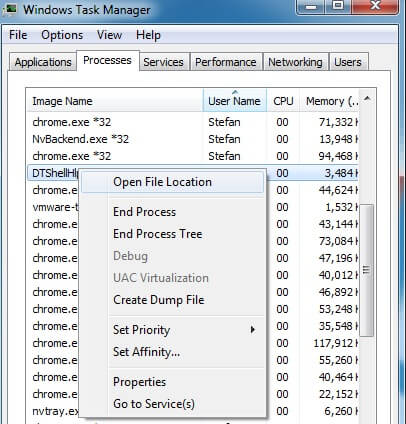
Next, run all the files in that location in the free online virus scanner below:

Don’t hesitate to end the selected process if its files get flagged as dangerous. Also, you should delete the dangerous files and their folders from the computer.

Software bundling is a popular method that many browser hijackers use to get installed inside the system. Therefore, if you have recently installed a new app on your PC, and you believe that this app has introduced CaptchaToday to your machine, it is best to uninstall it along with any other suspicious-looking apps that you don’t use, or you can’t remember installing.
To do that, open the Control Panel from the Start menu and select Program>>>Uninstall a Program. Then, filter the installed programs by date of installation and uninstall any app that you don’t want to keep on the system.
After you are done, close the Control Panel and click the Start menu button again. Then, type msconfig in the search field and hit enter. In the new System Configuration window that appears on the screen, select the Startup tab and uncheck any startup entries that you believe are linked to the hijacker activity. Then click OK.
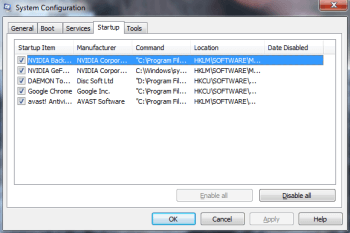

A browser hijacker like CaptchaToday may make changes in the DNS settings without notifying you. Therefore, in this step, we will show you how to revoke any such changes. For that, open Network Connections (type it in the Start menu search bar) and then select the network adapter that you are connected to. Next, right-click on it and select Properties.
This will open a Properties window on your screen. In it, highlight Internet Protocol Version 4 (ICP/IP), and then click the Properties button at the bottom. In the new window, select the Obtain DNS server address automatically option and click on the Advanced button at the bottom. Next, in the Advanced window, select the DNS tab and remove any rogue DSN, then click > OK.
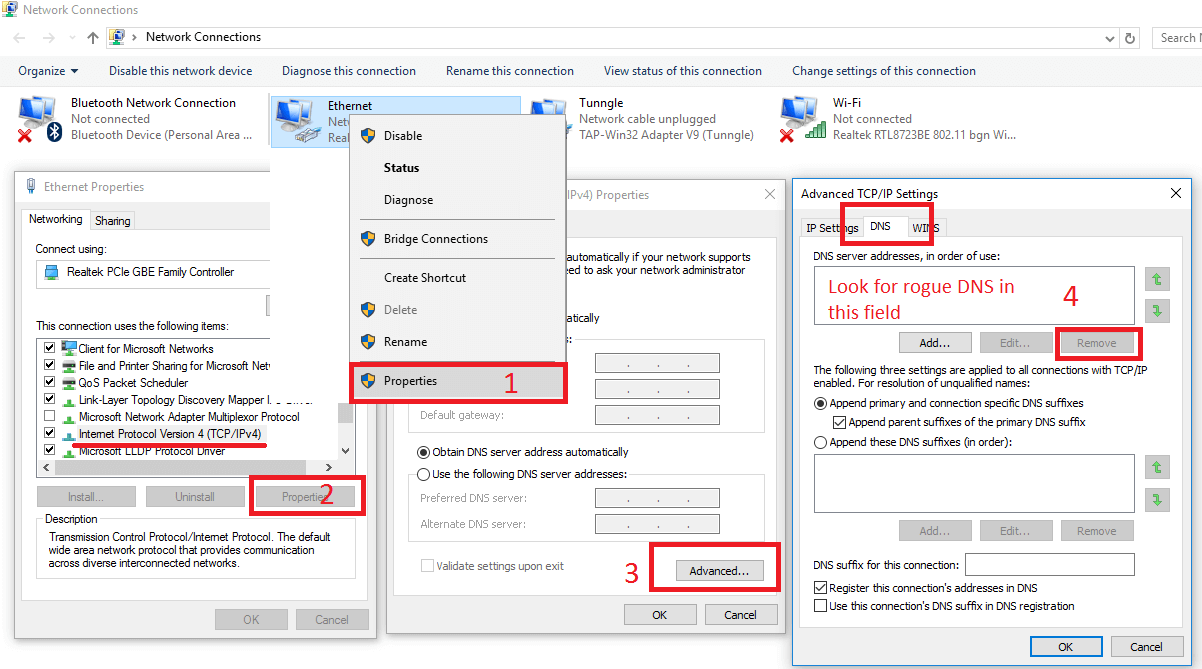

This step explains some additional instructions on how to clean your browser from the traces of CaptchaToday. In the images below, we are using Google Chrome as an example, but you can apply the same instructions in any browser that has been hijacked.
Start with a Right click on the browser’s shortcut icon and select —> Properties.
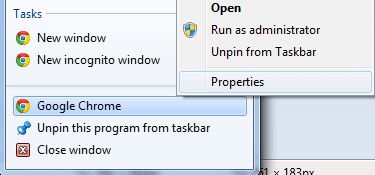
After that, in the Properties window select —–> Shortcut and make sure that you remove everything that has been added after .exe in the Target section.
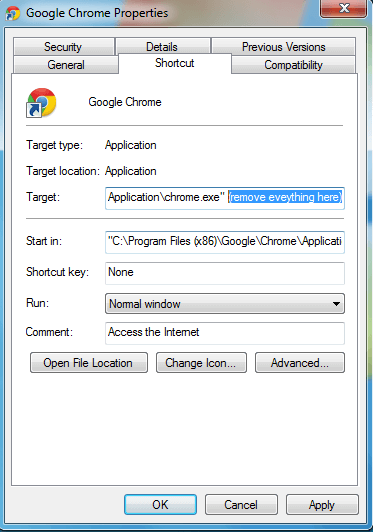
![]() Remove CaptchaToday from Chrome:
Remove CaptchaToday from Chrome:
If your browser is open, close it and then navigate to:
C:/Users/!!!!USER NAME!!!!/AppData/Local/Google/Chrome/User Data.
Find the “Default” folder and rename it to Backup Default. Then, restart the browser and check for any signs of CaptchaToday in it.


As a final step, we recommend you also check your Hosts file for changes. To open it, copy the following:
notepad %windir%/system32/Drivers/etc/hosts
Then, paste it in the Start menu search field and press Enter.
If you are hacked, there will be a number of suspicious IPs under Localhost in the text:
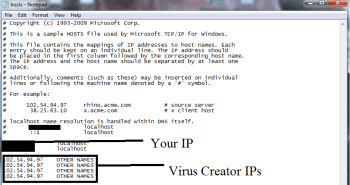
In case you notice something unusual and disturbing in your file, please leave us a comment.
Next, start the Registry Editor (Regedit in the windows search field and press Enter) and do the following:
- Inside the Editor, press CTRL and F from the keyboard at the same time.
- Write the name of the browser hijacker in the Find box.
- Press Find Next and delete any results that are matching that name.
Be Careful! Any wrong deletions may corrupt your Operating System in such a way that it may not be possible to repair. If you are not sure, please use a professional removal software.
Finally, use the left panel of the Registry Editor to manually go to these directories:
- HKEY_CURRENT_USER—-Software—–Random Directory.
- HKEY_CURRENT_USER—-Software—Microsoft—-Windows—CurrentVersion—Run– Random
- HKEY_CURRENT_USER—-Software—Microsoft—Internet Explorer—-Main—- Random
Search for any randomly named files and folders and if you believe they are part of CaptchaToday, delete them.
In case the manual removal guide doesn’t help, you still can get rid of CaptchaToday by using the powerful removal program linked on this page or our free online virus scanner.
CaptchaToday is a form of rogue browser-targeting software that may expose your computer to danger by showing potentially unsafe ads and push notifications in the browser. CaptchaToday typically gets added to the browser after the user installs a file bundle that carries it. The term that is most commonly used to describe software like CaptchaToday is a browser hijacker. This is not a virus, but it is still something that shouldn’t be ignored or allowed to remain in the browser or the computer. The main purpose of CaptchaToday and other similar apps is to generate income through paid online promotions of different sites and online services. This is why you are likely to start seeing an increased number of online advertisements while browsing if CaptchaToday is integrated with your browser. Another common trait of such hijackers is their ability to track the online activity of the user. Collecting such data allows the hijacker to tailor its ads in accordance with what each individual user likes, as indicated by their browsing habits. One problem with this activity is that your data may end up getting sold to third parties whose intentions might be less innocuous.
CaptchaToday is less dangerous compared to Ransomware, Trojans, and other malware, but it’s still not safe software. CaptchaToday can be dangerous if it starts to show ads that promote harmful and illegal sites in your browser, as this can get you targeted by hackers. This is the main problem with browser hijackers – the fact that the content promoted by them is more often than not questionable at best, harmful at worst. It is for this reason that it is inadvisable to click on any ads, banners, or push notifications that may show up in your browser during the time the hijacker is attached to it, no matter how tempting or legitimate the online offer may seem. Another danger associated with hijackers is the potential for hackers and scammers to get a hold of personal details about you and then use those details to target you with their scams and malware. Although most hijackers collect data from the users’ browsers exclusively for advertising purposes, the fact that the people behind such software are almost never upfront about what data they collect or how they use it is another major reason to mistrust browser hijackers.
To remove CaptchaToday, you must clean both your system and your browsers from rogue software, data, and settings. First, delete any rogue program and data that may be in the system and then, to remove CaptchaToday, perform a meticulous browser clean-up of all your browsers. Step 1: Use the Uninstall a Program (Programs and Features) to find and delete the program that may have had CaptchaToday bundled with it. Step 2: Using the Task Manager, quit any processes that are found to be rogue/related to CaptchaToday. Step 3: Check the DNS settings, Hosts file, list of Startup items, and the Registry of your PC for anything added and/or changed in them by CaptchaToday and delete the added entries and reverse the made changes. Step 4: Go to the main browser, open the Extensions page, and delete from it any rogue or unfamiliar add-ons you may find there. After this, go to the Privacy and Security section and clear the browsing data from there. Finally, do this for every browser that’s in the system, including ones that don’t show signs of CaptchaToday infection.

Leave a Reply